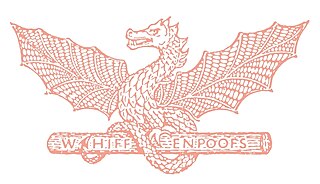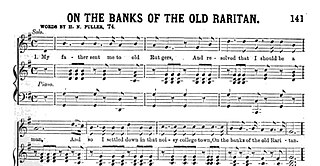Lyrics
Written by H.S. Durand 1881
Music composed by Karl Wilhelm; (SATB) arr. Robert Bonds ‘71
Bright College years, with pleasure rife, The shortest, gladdest years of life; How swiftly are ye gliding by! Oh, why doth time so quickly fly? The seasons come, the seasons go, The earth is green or white with snow, But time and change shall naught avail To break the friendships formed at Yale.
We all must leave this college home, About the stormy world to roam; But though the mighty ocean’s tide Should us from dear old Yale divide, As round the oak the ivy twines The clinging tendrils of its vines, So are our hearts close bound to Yale By ties of love that ne’er shall fail.
In after years, should troubles rise To cloud the blue of sunny skies, How bright will seem, through mem’ry’s haze Those happy, golden, bygone days! Oh, let us strive that ever we May let these words our watch-cry be, Where’er upon life’s sea we sail:
“For God, for Country and Yale!” [2]

"Die Wacht am Rhein" is a German patriotic anthem. The song's origins are rooted in the historical French–German enmity, and it was particularly popular in Germany during the Franco-Prussian War, World War I, and World War II. The original poem was written by Max Schneckenburger during the Rhine crisis of 1840, and is generally sung to music written by Karl Wilhelm in 1854, seven years after Schneckenburger's death.
A fight song is a rousing short song associated with a sports team. The term is most common in the United States and Canada. In Australia, Mexico, and New Zealand, these songs are called the team anthem, team song, or games song. First associated with collegiate sports, fight songs are also used by secondary schools and in professional sports.

"Far Above Cayuga's Waters" is Cornell University's alma mater. The lyrics were written circa 1870 by roommates Archibald Croswell Weeks, and Wilmot Moses Smith, and set to the tune of "Annie Lisle", a popular 1857 ballad by H. S. Thompson about a heroine dying of tuberculosis.

"Carmen Ohio" is the oldest school song still used by Ohio State University. The song was composed by freshman athlete and Men's Glee Club member Fred Cornell in 1902 or 1903. According to some accounts, he composed it on the train ride home from Ann Arbor, Michigan after Ohio State suffered an 86-0 loss to the Michigan Wolverines. The song is set to the tune of "Spanish Hymn", or "Spanish Chant". The Men's Glee Club first performed it in 1903; however, it did not gain popularity until after its publication in The Lantern on October 10, 1906. At the following Ohio State–Michigan football game on October 20, 1906, "Carmen Ohio" was published in the program. In 1915, Cornell recalled that he wrote the song in 1903 at the request of the Men's Glee Club, and other family members later stated that the train story might be an exaggeration or outright fabrication. Currently, after every home football game in Ohio Stadium, win or lose, the football team and the crowd sing the first verse of Carmen Ohio, accompanied by The Ohio State University Marching Band. It is also sung by new graduates at the end of the university's commencement ceremonies, after diplomas are distributed.

The Yale Whiffenpoofs is a collegiate a cappella singing group at Yale University. Established in 1909, it is the oldest such group in the United States. Best known for "The Whiffenpoof Song", the group is composed of 14 senior students who compete for admission in the spring of their junior year. Former members include Cole Porter and Jonathan Coulton.

The "UNH Alma Mater" is the official alma mater of the University of New Hampshire in Durham, New Hampshire. The lyrics to the song were written by Herbert Fisher Moore, an 1898 graduate of the school, and are sung to the tune "Lancashire" by Henry Smart.

"On the Banks of the Old Raritan" is a song, or alma mater, associated with Rutgers, The State University of New Jersey, in the United States. The original lyrics were written in 1873 by Howard Newton Fuller, an 1874 graduate of Rutgers College. Fuller quickly prepared the song as a school hymn for the college's Glee Club, an all-male choral ensemble, before a performance in Metuchen, New Jersey. Fuller chose to set the lyrics to the tune of melody, "On the Banks of the Old Dundee", a popular Scottish melody regarded as a drinking song, and titled the song for the Raritan River.
"Song to Old Union" is the alma mater of Union College in Schenectady, New York. It was written by Fitz Hugh Ludlow for Union's 1856 commencement ceremonies. It is sung each year at graduation, although it is the rare student or alumnus who knows more than the first verse and chorus.

The "Penn State Alma Mater" is the official alma mater of The Pennsylvania State University. The song was accepted by the university in 1901.
Brown University traditions hold that two songs, "Alma Mater" and "Ever True to Brown", are sung at public events and gatherings related to the university. The traditional alma mater song, "Old Brown," was created in 1860 and "Ever True to Brown", the second school fight song, was written by Donald Jackson. The song is played by the Brown Band at major varsity athletic events and at formal events such as Convocation and Commencement. An unofficial version offers humorous alternative lyrics.
Henry Durand wrote, with Carl Wilhelm, "Bright College Years", the Yale University alma mater.

"Hail to Pitt" is the most traditional fight song of the University of Pittsburgh, which is commonly referred to as Pitt. The saying "Hail to Pitt!" is also the most traditional and commonly used slogan of the University of Pittsburgh and its athletics teams. The slogan is frequently used in promotional material, printed on merchandise and souvenirs. It was also the title of a 1982 history of Pitt athletics by author Jim O'Brien. The slogan is often used among alumni as a statement of affiliation, including as a closing signature in conversation or correspondence between alumni, and is sometime abbreviated as "HTP" or "H2P", the latter of which is a registered trademark of the university and is frequently used on official university signage and merchandise.

The alma mater of the University of Pittsburgh was adopted soon after the University changed its name in 1908 from the Western University of Pennsylvania to its current moniker. Lyrics were written by George M. P. Baird, class of 1909 and were set to the tune of what was then the Austrian National Anthem. A new tune for the "Alma Mater" hymn was composed by Charles W. Scovel, class of 1883, but it was not widely adopted and was either lost or became obscure.

The Syracuse University Alma Mater is the school song for Syracuse University. It was written by Junius W. Stevens in 1893, and is based on the then-popular Irish melody Annie Lisle. It was first sung under the title "Song of Syracuse" by the University Glee and Banjo Club on March 15, 1893 at the Wieting Opera House.
"Our Alma Mater" is the alma mater of The College of William & Mary. It was written by James Southall Wilson, a William & Mary alumnus from the class of 1904. Usually, only the first and fourth verses are sung. The song is set to the tune of Annie Lisle, which is used in the alma mater songs of many other colleges, most notably Cornell University.
"Fight For Santa Clara" is the fight song of the Santa Clara University. It was composed by Winnie Cutter, a graduate of the class of 1905. in 1898 following the last-minute football victory over the University of Chicago that clinched a league championship.
"Boola Boola" is a football song of Yale University. It has enjoyed widespread popularity over the years and has been adapted to many other uses. Despite its popularity, it is not Yale's official fight song, which is "Bull Dog", by Cole Porter.

The Ohio State University Men's Glee Club is an all-male choral ensemble at Ohio State University. Officially founded in 1875, the Men's Glee Club is one of the oldest student organizations on Ohio State's campus and one of the oldest collegiate glee clubs in the United States. The group has garnered many accolades, most notably winning Choir of the World 1990 from the Llangollen International Musical Eisteddfod.

"Varsity" is a fight song of the University of Michigan.












